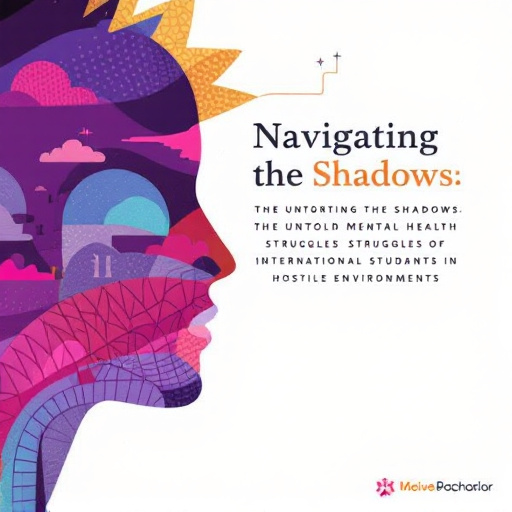Featured Articles
- "Ghosting the Globe: The Rise of International Students' Invisible Struggles in Mental Health Support"
- Navigating Cultural Shock: How International Students Are Redefining Home Away from Home in Unlikely Places
- Navigating Cultural Shock: The Hidden Mental Health Crisis Among International Students in a Post-Pandemic World
- Navigating the Shadows: The Untold Mental Health Struggles of International Students in Hostile Environments
- Navigating the Unknown: How International Students Are Shaping Local Cultures and Communities in Unexpected Ways
Navigating Cultural Shock: The Hidden Mental Health Crisis Among International Students in a Post-Pandemic World
Navigating Cultural Shock: The Hidden Mental Health Crisis Among International Students in a Post-Pandemic World
International students often encounter a unique mental health crisis due to cultural shock, exacerbated by the challenges of the post-pandemic world. This article explores the multifaceted dimensions of this phenomenon—including the personal experiences, mental health implications, potential solutions, and the vital importance of community and support networks.
Understanding Cultural Shock
Cultural shock represents the emotional and psychological strain experienced when an individual finds themselves in an unfamiliar environment. For international students, this phenomenon can unfold like a dramatic plot twist in a novel, filled with disorientation and isolation. According to a study by Ward, Bochner, and Furnham (2001), cultural shock can be inherently cyclical, often comprising stages such as honeymoon, negotiation, adjustment, and adaptation.
You Are Not Alone
Misunderstandings and stressors are natural side effects of navigating a new culture, language barriers, and social norms. For instance, let’s take the case of Maria, a 23-year-old student from Brazil who moved to the United States for her master's degree. She described feeling "like a fish out of water," where she often misunderstood local idioms and social cues. Her isolation peaked during the pandemic when social distancing measures drastically limited her interactions. She isn't alone; studies reveal that around 75% of international students report experiencing some form of cultural shock upon arrival (International Student Mobility Report, 2021).
Statistics on Mental Health Among International Students
A staggering 50% of international students reported symptoms of anxiety and depression during their studies abroad (Health and Wellbeing Report, 2022). The pandemic has only intensified these statistics, creating a perfect storm of loneliness and frustration. The American Psychological Association emphasizes that socialization significantly impacts mental health, especially for those already battling culture-induced stress (APA, 2022).
From Isolation to Connection
An important aspect of overcoming cultural shock lies in forging connections with others. Establishing friendships can act like an antidote, dispelling feelings of loneliness. Maria found solace in connecting with other international students, spending evenings sharing meals and stories, where she learned that many of her peers faced similar struggles. This highlights the essence of empathy and solidarity; shared experiences can pave the way toward resilience.
Humorous Anecdotes of Adjustment
Sometimes, laughter is the best medicine. “I remember the first time I was invited to a barbecue,” Maria recalls, chuckling. “I thought ‘barbecue’ meant a fancy dinner, but I ended up finding myself lost among hot dogs and hamburgers—both foreign concepts to me!” Adjusting to the light-hearted social rituals and even the casual differences in how people interact can foster a greater sense of belonging.
The Role of Institutions
Educational institutions play a significant role in mitigating cultural shock among international students. They must prioritize mental health resources and develop inclusive policies addressing students' unique challenges. Universities should provide orientation programs that offer cultural sensitivity training and workshops specifically designed to help students understand and adjust to their new environment.
Peer Support Systems
The integration of peer support systems can also be beneficial. Institutions like the University of California, Berkeley have launched peer mentor programs where established students guide newcomers through the intricate tangle of cultural adjustment. These programs foster not just academic success, but emotional well-being, bridging the gap between different cultures.
Breaking Down Barriers
Language barriers may appear insurmountable, especially in social situations. A 2021 report from the Educational Testing Service indicates that non-native English speakers score lower on social confidence than their native peers. But, what if students could transform that anxiety into an opportunity? For instance, many universities offer writing support and language resources that allow international students to enhance their language skills while simultaneously fostering friendships. Being able to navigate conversations becomes less about ‘survival’ and more about connection.
Practicing Mindfulness
Mindfulness and self-care strategies can significantly alleviate symptoms of cultural shock. Practices like meditation, yoga, and even journaling can assist international students in grounding themselves amid disorientation. Maria took up meditation, finding that dedicating just ten minutes daily helped calm her racing thoughts and feelings of alienation.
Finding Balance
Finding balance between academic obligations and social engagements is crucial. It’s important to remember that no one expects perfection; we are all human, wading through life’s unpredictable currents. Allowing time for social activities may enhance the overall experience and reduce stress, helping students remember why they ventured into the unknown in the first place.
The Family Connection
Family dynamics can also be affected by cultural shock. Many international students experience homesickness, prompting them to seek familiar comforts—like recipes from home. Maria discovered that cooking traditional meals sometimes helped ease her feelings of separation. "When I prepare my family's recipe for feijoada, it’s like another piece of home comes alive,” she reflects. This coping mechanism can serve as a bridge connecting the old and new worlds.
Embracing New Experiences
Engaging with local culture through exploration can greatly aid the cultural adjustment process. From joining clubs, attending events, to volunteering in the community, these activities will help students discover new facets of their host country while generating unique memories. Maria took salsa dancing lessons, which not only allowed her to embrace a new skill but also to meet a diverse group of friends.
Realizing Your Strengths
Finally, as international students navigate cultural differences, it’s essential to recognize their strengths. In adapting to a new culture, they also learn resilience, independence, and open-mindedness—qualities that will serve them well for the rest of their lives. These experiences, albeit challenging, contribute to personal growth and development. Remember the wisdom in a popular saying: “What doesn’t kill you makes you stronger.” While cultural shock may feel overwhelming, it can ultimately be a powerful catalyst for transformation.
Conclusion: A Call to Action
If you are an international student grappling with cultural shock, know that it is perfectly natural and okay to seek help. Universities, peers, and community resources are available to support you. Let us collectively dismantle the stigma surrounding mental health and embrace the transformative journey that cultural exploration offers. After all, the world may be challenging, but navigating it together can lead to the most remarkable stories of triumph.
As we move forward in this post-pandemic world, it’s imperative to foster an inclusive atmosphere that embraces diversity and strengthens community ties. Let’s advocate for better mental health resources, peer connections, and the acknowledgment that, while our journeys may diverge from the norm, they offer invaluable insights into the human experience.




